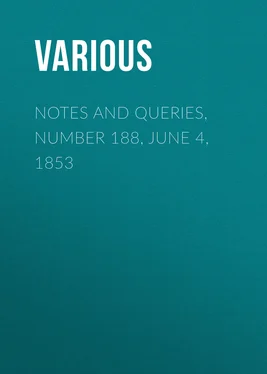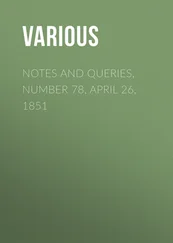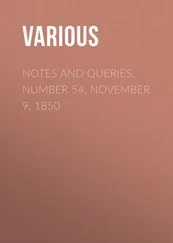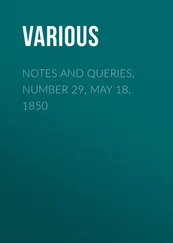Various - Notes and Queries, Number 188, June 4, 1853
Здесь есть возможность читать онлайн «Various - Notes and Queries, Number 188, June 4, 1853» — ознакомительный отрывок электронной книги совершенно бесплатно, а после прочтения отрывка купить полную версию. В некоторых случаях можно слушать аудио, скачать через торрент в формате fb2 и присутствует краткое содержание. Жанр: foreign_antique, periodic, foreign_edu, на английском языке. Описание произведения, (предисловие) а так же отзывы посетителей доступны на портале библиотеки ЛибКат.
- Название:Notes and Queries, Number 188, June 4, 1853
- Автор:
- Жанр:
- Год:неизвестен
- ISBN:нет данных
- Рейтинг книги:5 / 5. Голосов: 1
-
Избранное:Добавить в избранное
- Отзывы:
-
Ваша оценка:
- 100
- 1
- 2
- 3
- 4
- 5
Notes and Queries, Number 188, June 4, 1853: краткое содержание, описание и аннотация
Предлагаем к чтению аннотацию, описание, краткое содержание или предисловие (зависит от того, что написал сам автор книги «Notes and Queries, Number 188, June 4, 1853»). Если вы не нашли необходимую информацию о книге — напишите в комментариях, мы постараемся отыскать её.
Notes and Queries, Number 188, June 4, 1853 — читать онлайн ознакомительный отрывок
Ниже представлен текст книги, разбитый по страницам. Система сохранения места последней прочитанной страницы, позволяет с удобством читать онлайн бесплатно книгу «Notes and Queries, Number 188, June 4, 1853», без необходимости каждый раз заново искать на чём Вы остановились. Поставьте закладку, и сможете в любой момент перейти на страницу, на которой закончили чтение.
Интервал:
Закладка:
The sixth, done also by J. Eyre:
"Ye portraiture of one Master Ben Jonson, as on ye walls of Master Will Shakspeare's rooms in Clinke Streete, Southwarke."—J. E. 1643.
The first three, in justice to Hollar, independent of the admirers of the immortal bard and lovers of antiquities, should be engraved as "Facsimiles of the Drawings." This shall be done on my receiving the names of sixty subscribers, the amount of subscription one guinea, for which each subscriber will receive three engravings, to be paid for when delivered.
P. T.P. S.—These curious drawings may be seen at No. 1. Osnaburgh Place, New Road.
Thomas Shakspeare. —From a close examination of the documents referred to (as bearing the signature of Thomas Shakspeare) in my last communication to "N. & Q.," Vol. vii., p. 405.), and from the nature of the transaction to which they relate, my impression is, that he was by profession a money scrivener in the town of Lutterworth; a circumstance which may possibly tend to the discovery of his family connexion (if any existed) with William Shakspeare.
Charlecote.Passage in Macbeth, Act I. Sc. 5. —
" · · · Come, thick night,
And pall thee in the dunnest smoke of hell,
That my keen knife see not the wound it makes,
Nor heaven peep through the blanket of the dark,
To cry, Hold, hold!"
In Mr. Payne Collier's Notes and Emendations , p. 407., we are informed that the old corrector substitutes blankness for blanket . The change is to me so exceedingly bad, even if made on some sort of authority (as an extinct 4to.), that I should have let it be its own executioner, had not Mr. Collier apparently given in his adhesion to it. I now beg to offer a few obvious reasons why blanket is unquestionably Shakspeare's word.
In the Rape of Lucrece , Stanza cxv., we have a passage very nearly parallel with that in Macbeth :
"O night, thou furnace of foul reeking smoke,
Let not the jealous day behold thy face,
Which underneath thy black all-hiding cloak ,
Immodestly lies martyr'd with disgrace."
In Lucrece , the cloak of night is invoked to screen a deed of adultery; in Macbeth the blanket of night is invoked to hide a murder: but the foul, reeking, smoky cloak of night, in the passage just quoted, is clearly parallel with the smoky blanket of night in Macbeth . The complete imagery of both passages has been happily caught by Carlyle ( Sartor Resartus , 1841, p. 23.), who, in describing night, makes Teufelsdröckh say:
"Oh, under that hideous coverlet of vapours, and putrefactions, and unimaginable gases , what a fermenting-vat lies simmering and hid!"
C. Mansfield Ingleby.Birmingham.
"Discourse of Reason" (Vol. vii., p. 497.).—This phrase, "generally supposed to be peculiarly Shakspearian," which A. E. B. has indicated in his quotation from Philemon Holland, occurs also in Dr. T. Bright's Treatise of Melancholy , the date of which is 1586. In the third page of the dedicatory epistle there is this sentence:
"Such as are of quicke conceit, and delighted in discourse of reason in naturall things."
Here, then, is another authority against Gifford's proposed "emendation" of the expression as it occurs in Hamlet .
M. D.Minor Notes
The MSS. of Gervase Hollis. —These were taken during the reign of Charles I., and continue down to the middle of Charles II. In Harl. MSS. 6829, will be found a most curious and valuable volume, containing the painted glass, arms, monuments, brasses, and epitaphs in the various churches and chapels, &c. throughout the county of Lincoln. The arms are all drawn in the margin in colours. Being taken before the civil war, they contain all those which were destroyed or defaced by the Parliament army. They were all copied by Gough, which he notices in his Brit. Top. , vol. i. p. 519., but not printed.
His genealogical collections are contained in a series of volumes marked with the letters of the alphabet, and comprehended in the Lansdowne Catalogue under No. 207. The Catalogue is very minute, and the contents of the several volumes very miscellaneous; and some of the genealogical notes are simply short memoranda, which, in order to be made available, must be wrought out from other sources. They all relate more or less to the county of Lincoln. One of these, called "Trusbut," was presented to the British Museum by Sir Joseph Banks in 1817, and will be found in Add. MSS. 6118.
E. G. Ballard.Anagrams. —The publication of two anagrams in your Number for May 7, calls to my mind a few that were made some years ago by myself and some friends, as an experiment upon the anagrammatic resources of words and phrases. A subject was chosen, and each one of the party made an anagram, good, bad, or indifferent, out of the component letters. The following may serve as a specimen of the best of the budget that we made.
1. French Revolution.
Violence, run forth!
2. Swedish Nightingale.
Sing high! sweet Linda. ( q. d. di Chamouni.)
3. Spanish Marriages.
Rash games in Paris; or, Ah! in a miser's grasp.
4. Paradise Lost.
Reap sad toils.
5. Paradise Regained.
Dead respire again.
Birmingham.
Family Caul—Child's Caul. —The will of Sir John Offley, Knight, of Madeley Manor, Staffordshire (grandson of Sir Thomas Offley, Lord Mayor of London temp. Eliz.), proved at Doctors' Commons 20th May, 1658, contains the following singular bequest:
"Item, I will and devise one Jewell done all in Gold enammelled, wherein there is a Caul that covered my face and shoulders when I first came into the world, the use thereof to my loving Daughter the Lady Elizabeth Jenny, so long as she shall live; and after her decease the use likewise thereof to her Son, Offley Jenny, during his natural life; and after his decease to my own right heirs male for ever; and so from Heir to Heir, to be left so long as it shall please God of his Goodness to continue any Heir Male of my name, desiring the same Jewell be not concealed nor sold by any of them."
Cestriensis.Numerous Progeny. —The London Journal of Oct. 26, 1734, contains the following paragraph:
"Letters from Holderness, in Yorkshire, mention the following remarkable inscription on a tombstone newly erected in the churchyard of Heydon, viz. 'Here lieth the body of William Strutton, of Padrington, buried the 18th of May, 1734, aged 97, who had by his first wife 28 children, and by a second wife 17; own father to 45, grandfather to 86, great-grandfather to 97, and great-great-grandfather to 23; in all 251.'"
T. B. H.Queries
SMITH, YOUNG, AND SCRYMGEOUR MSS
Thomas Smith, in his Vitæ Illustrium , gives extracts from a so-called Ephemeris of Sir Peter Young, but which Sir Peter compiled during the latter years of his life. Thomas Hearne says, in a note to the Appendix to Leland's Collectanea , that he had had the use of some of Smith's MSS. This Ephemeris of Sir Peter Young may be worth the publishing if it can be found: can any of your readers say whether it is among Smith's or Hearne's MSS., or if it be preserved elsewhere? Peter Young, and his brother Alexander, were pupils of Theodore Beza, having been educated chiefly at the expense of their maternal uncle Henry Scrymgeour, to whose valuable library Peter succeeded. It was brought to Scotland by Alexander about the year 1573 or 1574, and was landed at Dundee. It was especially rich in Greek MSS.; and Dr. Irvine, in his "Dissertation on the Literary History of Scotland," prefixed to his Lives of the Scottish Poets , says of these MSS. and library, "and the man who is so fortunate as to redeem them from obscurity, shall assuredly be thought to have merited well from the republic of letters." It is much to be feared, however, that as to the MSS. this good fortune awaits no man; for Sir Peter Young seems to have given them to his fifth son, Patrick Young, the eminent Greek scholar, who was librarian to Prince Henry, and, after his death, to the king, and to Charles I. Patrick Young's house was unfortunately burned, and in it perished many MSS. belonging to himself and to others. If Scrymgeour's MSS. escaped the fire, they are to be sought for in the remnant of Patrick Young's collection, wherever that went, or in the King's Library, of which a considerable part was preserved. Young's house was burned in 1636, and he is supposed to have carried off a large number of MSS. from the royal library, after the king's death in 1649. If therefore Scrymgeour's MSS. were among these, it is possible that they may yet be traced, for they would be sold with Young's own, after his death in 1652. This occurred on the 7th of September, rather suddenly, and he left no will, and probably gave no directions about his MSS. and library, which were sold sub hastâ , probably within a few months after his death, and with them any of the MSS. which he may have taken from the King's Library, or may have had in his possession belonging to others. Smith says that he had seen a large catalogue of MSS. written in Young's own hand. Is this catalogue extant? Patrick Young left two daughters, co-heiresses: the elder married to John Atwood, Esq.; the younger, to Sir Samuel Bowes, Kt. A daughter of the former gave to a church in Essex a Bible which had belonged to Charles I.; but she knew so little of her grandfather's history that she described him as Patrick Young, Esq., library keeper to the king, quite unconscious that he had been rector of two livings, and a canon and treasurer of St. Paul's. Perhaps, after all, the designation was not so incorrect, for though he held so many preferments, he never was in priest's orders, and sometimes was not altogether free from suspicion of not being a member of the Church of England at all, except as a recipient of its dues, and of course, a deacon in its orders.
Читать дальшеИнтервал:
Закладка:
Похожие книги на «Notes and Queries, Number 188, June 4, 1853»
Представляем Вашему вниманию похожие книги на «Notes and Queries, Number 188, June 4, 1853» списком для выбора. Мы отобрали схожую по названию и смыслу литературу в надежде предоставить читателям больше вариантов отыскать новые, интересные, ещё непрочитанные произведения.
Обсуждение, отзывы о книге «Notes and Queries, Number 188, June 4, 1853» и просто собственные мнения читателей. Оставьте ваши комментарии, напишите, что Вы думаете о произведении, его смысле или главных героях. Укажите что конкретно понравилось, а что нет, и почему Вы так считаете.












